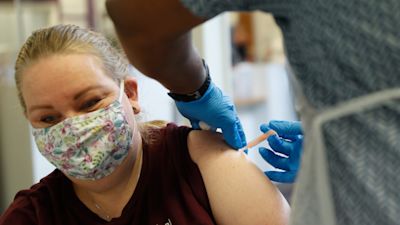Covid: Why the study into vaccine mixing is so important

Here are two Covid questions, thrown up by the rate at which the Indian variant is infecting parts of the UK:First, does it show that the traffic light system, which was designed to prevent the UK from importing new strains and variants from abroad, is unfit for purpose?The delay of one to two weeks in moving India from the amber to red category - which I’ve been banging on about for a month - is relevant, and looks like a serious government mistake.But isn't there a more fundamental flaw in the system?Ministers keep pointing out that with India in the amber category the UK should have been protected - because passengers from India were supposed to quarantine at home for 10 days and take tests on days two and eight.We weren’t protected though, were we?So either home quarantine is intrinsically leaky, or those passengers ignored tests and quarantine. Either way, amber offered no serious protection. As one government adviser told me: “At best the traffic light system slows strains coming in from abroad. It conspicuously doesn’t stop them.”He added that it was clear the traffic light system had “failed".Second question: Should the government accelerate plans to "mix" vaccines, that is to give a Pfizer or Moderna second jab to those who've had the AstraZeneca as first jab? (I can describe them as "plans" because Matt Hancock has already announced that the autumn booster shot will very likely be a shot of a vaccine different from what's currently being administered to each of us).Here is the point. As I mentioned on Monday, if the Indian variant escapes the vaccine in a modest way, if the vaccine is less effective on the Indian variant than on the Kent one, that reduced efficacy seems to apply to the AstraZeneca/Oxford vaccine, not the Pfizer and Moderna ones, scientists tell me.And just to clarify, they say there may be a 10 or 15 percentage point reduction in the efficacy of AstraZeneca vaccine on serious disease, which means the vaccine still works pretty effectively, but just not quite as well. Even so, any reduction in efficacy has implications for the likely burden on the NHS, given that the transmissibility of the Indian strain - its relative infectiousness - appears to be setting new Covid-19 records.
Listen to the ITV News coronavirus podcast
There is an ongoing study of whether mixing the vaccines improves or worsens protection. And I am told that there is a strong theoretical argument that having a second jab of Pfizer or Moderna after a first AstraZeneca jab would boost protection against the India strain. "We are pretty certain that having Pfizer or Moderna for the second dose would help cut serious disease from the Indian variant," said one scientist. All this is being looked at by the government funded Com-COV study. What we do know from its early results is that there is an increased risk of mild Covid-like symptoms as a side effect of the second jab, when vaccines are mixed, but no increased risk of serious side effects.The chief investigator on the Com-COV trials, Matthew Snape, said there were no safety concerns about mixing the vaccines, but they did not yet know "if the immune response will be affected".